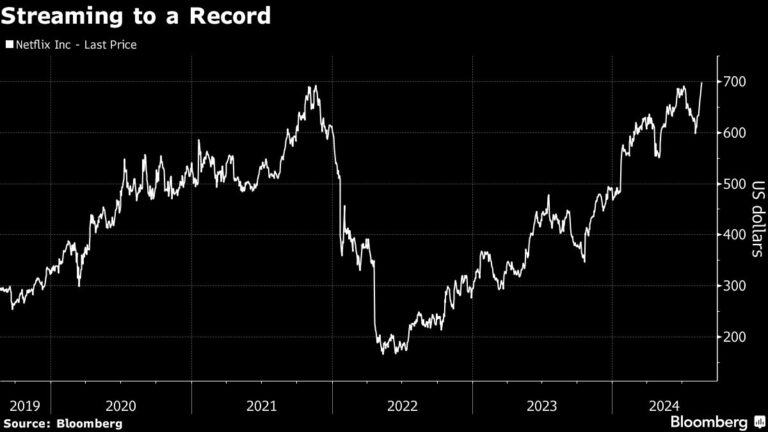(Bloomberg) — As questions swirl around Federal Reserve policy, the state of the economy and the U.S. presidential election, at least one thing is clear on Wall Street: Spending on artificial intelligence remains a top priority.
Most read articles on Bloomberg
Companies are pouring tens of billions of dollars into building AI infrastructure and services, and the beneficiaries, especially Nvidia Inc., are all but guaranteed to see growth. The chipmaker’s earnings report next week could provide more clarity on AI demand and help propel its stock back to all-time highs.
“While the buildout of AI infrastructure is far from complete, the results provide very encouraging insights into the growth we can expect over the next few years,” said Eric Sword, principal portfolio manager at Voya Investment Management.
Sword said he’s not at the end of the line on this theme and is “still early off the bench,” adding, “So while we’re going to see some volatility in the short term, we don’t have any concerns about where these AI hardware stocks will trade in the medium or long term.”
Nvidia shares were little changed on Wednesday.
Investors are scrutinizing spending levels more closely this earnings season, in some cases sending stocks lower for prioritizing capital spending over shareholder-friendly policies. Concerns about returns from AI investments led to a recent sell-off in tech stocks, but the dip was easily bought up as confidence grew that economic growth remains strong and AI spending will remain strong.
AI hardware and chip companies have led the Nasdaq 100’s rebound from its August lows, with Nvidia being the index’s best performer, up nearly 30% as of the latest close and just 6.1% from its all-time high. Peers Micron Technology, Marvell Technology, Super Micro Computer, Broadcom, Advanced Micro Devices and ARM Holdings have all also been key players in the rebound.
Nvidia’s earnings report comes just weeks after a group of big companies that account for more than 40% of Nvidia’s revenue, including Microsoft Corp., Amazon.com Inc., Alphabet Inc. and Meta Platforms Inc., highlighted their commitment to investing in AI. Strong monthly sales from Taiwan Semiconductor Manufacturing Co. (TSMC) also attested to robust AI demand.
CEOs of tech giants like Alphabet and Meta have said they’d rather overinvest in AI than risk underinvesting, suggesting that AI spending will remain strong even in weaker economic times, given the deep pockets of these companies.
The story continues
“Companies this large essentially have no resource constraints and can invest in AI for years if they feel missing out would jeopardize their advantage,” said Bryant VanCronkhite, senior portfolio manager at Allspring Global Investments.
The buildout of AI infrastructure is expected to be large-scale and long-term: Needham cited conversations with CEOs of generative AI infrastructure companies who said investments in data center infrastructure needed to support GenAI could reach $6 trillion.
Still, there’s evidence that the trend isn’t fully understood by the market. Solita Marcelli, chief investment officer for the Americas at UBS Global Wealth Management, estimates that capital spending by big tech companies could grow as much as 25% in 2025, well above the consensus forecast of 10% to 15% growth. “This is particularly positive for AI-driven companies in the semiconductor sector,” she writes.
AI spending has yet to translate into dramatic improvements in growth and efficiency for Nvidia’s major customers. But analysts believe the current pace of spending is sustainable. Morgan Stanley calls average capex intensity (a measure of capital expenditures relative to revenue) around 25%, a “healthy level.” Moreover, it notes that the capex-to-EBITDA ratio “indicates sufficient cash flow to support spending.”
Analyst Charlie Chan wrote that Nvidia’s results “should allay concerns and spur a recovery in stock prices across the AI supply chain.”
To be sure, some are still not convinced that AI investments are enough to sustain the rally in AI hardware stocks, given that their stocks are trading at levels that leave little room for disappointment. Some companies in the group, such as Supermicro and Dell Technologies, have struggled to regain the momentum they had earlier this year despite their recent strength.
“NVIDIA’s valuation could be justified if it could guarantee a sustainable revenue stream, but the risks seem high because companies that are spending would be rewarded if they stopped spending, whereas hardware only has downsides,” Allspring’s Van Cronkite said. “We’re not at the point where investors are ready to exit the stock, but they are starting to question the ROI of AI, and that’s the first step before the action gets more dramatic.”
Today’s Tech Charts
Shares of Netflix Inc. rose 1.5% on Tuesday, helping the company close at its highest price in three years. The company’s shares have risen more than 40% this year, far outperforming other streaming stocks as it works to boost profitability.
Top Technology Stories
U.S. semiconductor maker Microchip Technology Inc said on Tuesday that its servers had been hit by a cyber attack, forcing it to shut down some of its systems and scale back operations.
Walmart Inc. has raised about $3.6 billion by selling a stake in Chinese e-commerce company JD.com, ending an eight-year partnership that has seen revenues decline amid a tough environment for China’s tech giants.
Ola Electric Mobility Inc.’s soaring share price is a vindication of the efforts of its founders to push for an IPO despite initial skepticism about the company’s valuation.
Condé Nast has signed a multi-year pact with Open AI to license its magazine content, the latest high-profile media deal for the artificial intelligence startup.
Earnings due on Tuesday
Pre-Market
Analog Devices
GDS Holdings
Post Market
overview
Snowflake
Zoom Video
Wolfspeed Inc.
Zuora
Zep Health
–With assistance from Subrat Patnaik and Jeran Wittenstein.
(This is the latest information at the time of market opening.)
Most read articles on Bloomberg Businessweek
©2024 Bloomberg LP

